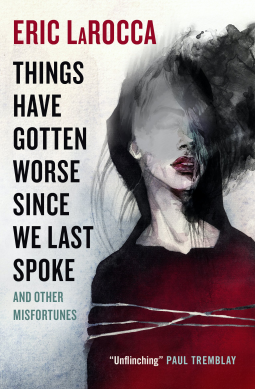Author: Eric LaRocca
Titan Books: Due on September, 2022
The original novella release of Eric LaRocca’s “Things Have Gotten Worse Since We Last Spoke,” was my first experience of the author. I listened to the audiobook edition, and, despite the odd formatting, a story told through private messages and chat room conversations, that performance was, at first odd and casual, and then spiraled into a very unexpected, very dark place. On the surface, it’s a story of manipulation and desperation, but as is the case with most fiction based on deeper themes, it’s a microcosm of the human desire to be recognized, and loved, to please another and have them reciprocate. It’s also a mirror of the darker truth that this sort of shared devotion is rare, and often fleeting. LaRocca, of course, takes it to its extreme, and just far enough beyond that extreme to be certain you will never forget to be certain you have done all that you can to earn your eyes.
This new collection adds two vastly different tales to that novella, “The Enchantment,” a story of yearning for an empty faith, isolation, and again, desperation, as a lonely woman fights the world, her husband, and other powers for something she can’t quite understand, but craves with all her soul… if she has one? This story is dark in different way from the first, much more sedate in its delivery, which makes the darkness insidiously sneaky.
The final story of the three, “You’ll Find it’s Like that all Over,” has a similar theme, but again, from a new angle. People want to be part of a bigger whole, to ‘get along,’ and be accepted. The protagonist of this story is caught in an unhealthy relationship – his husband is a racist, and his neighbor is foreign, and stand-offish. His attempt to befriend that neighbor politely (if not all that sincerely) lands him in a very strange place, and an even stranger state of mind. This one is full of twists and turns, but again, not the swan dive into emotional discomfort you get from “Things Have Gotten Worse Since We Last Spoke,” or the author’s other novella, “You’ve Lost a Lot of Blood.” It is filled with clever tests and conversation with underlying meaning.
The sense one gets from reading all three is of a strong literary voice with range. It would have been easy to try and mirror the style of the first novella, but instead the author has provided two deeply thoughtful, memorable, and intriguing stories that will take readers by surprise and leave them thinking. Highly recommended.
